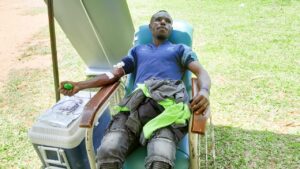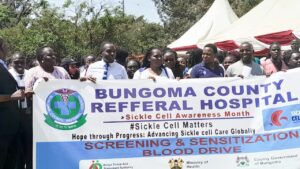By CARO SITUMA/GPU
Bungoma residents have been encouraged to donate blood regularly to support sickle cell patients.
Speaking at Bungoma Referral Hospital’s pediatric wing during Sickle Cell Awareness Month, the hospital’s medical superintendent, Simon Kisaka, stressed the urgent need for consistent blood donations to help manage sickle cell disease.

He explained that regular blood transfusions are essential for many patients, especially children, who rely on the community’s support to improve their quality of life and survival chances.
Kisaka urged residents to make blood donations a regular practice, highlighting that the ongoing shortage severely impacts those living with the condition.

He also called for routine screening among residents, pointing out that many people in the region may unknowingly suffer from sickle cell anaemia, increasing the risk of severe complications in later years of the patients
“The screening initiative aims to identify these cases early and provide necessary medical care, including treatment and counselling for those diagnosed,” Kisaka said.

He emphasized the importance of both blood donation and early detection in reducing the disease’s impact on affected individuals and their families.
The medical superintendent urged residents to take advantage of the screening to ensure better health outcomes and improved quality of life for those who may be affected.

Kisaka said that the hospital has ensured that every new born is screened for the disease for early treatment to avoid more complications
He said the campaign is part of a larger effort by the hospital to raise awareness about the disease and ensure that sickle cell patients in the region receive timely intervention.

The event was graced by professor Constance Tenge from Moi University, who called on the medical team to improve the welfare of the patients
Sickle cell anaemia is a genetic disorder that affects red blood cells, causing them to take on an abnormal shape, leading to issues such as blocked blood flow, pain, and frequent infections.




